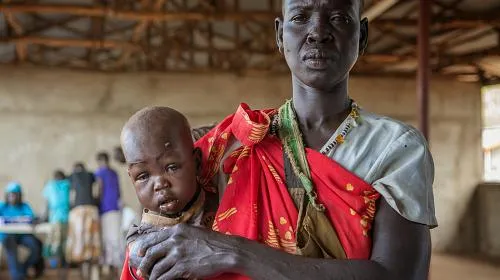Continuing conflict and start of rainy season put women and their children at risk of starvation
Bentiu, South Sudan – CARE, one of the leading aid agencies in South Sudan, is gravely concerned about the sharp increase of malnutrition, diseases and mortality rates of children affected by conflict. Severe acute malnutrition rates among children under five years has doubled since January 2014. According to the United Nations, an estimated 235,000 children under five will be malnourished in South Sudan and 50,000 may die if treatment services are not scaled up now.
“With the arrival of the rainy season and the continuation of conflict, the situation in Bentiu can only be described as a disaster” says CARE’s Program Coordinator Alain Lapierre. Over 38,000 people are sheltered in the protection areas in the UN base in the town of Bentiu, searching for safety and struggling daily to survive daily. “It is challenging to preserve their dignity”, Lapierre continues. “Infants are often too weak when they reach our medical facilities. Their families arrived after days of walking, without food, water or shelter. Last week alone, 18 children died from malnutrition or diarrhea here in the Bentiu protection areas.” The rainy season hampers the aid effort severely, in a country with very few paved roads.
CARE South Sudan’s Country Director Aimee Ansari just returned from visiting CARE’s mobile clinics. “I spoke to a woman with a one-month old baby. The baby had signs of malaria and malnutrition and I fear she will not survive. The mother was getting very little nutrition herself; she had almost no milk and no food. Our clinical officer did what he could but, given the fighting in this area, it is likely that it’s too dangerous for the mother to return for regular treatment. That’s the horrendous choice South Sudanese women have to make: returning to the clinic would put the woman at risk of rape or assault and yet, not returning would mean her child will almost certainly die.” CARE has set up clinics which provide emergency nutrition and medical assistance.
The town of Bentiu is devastated. Markets, hospitals, or schools have been damaged, looted or empty. People seek safety at UN compounds; however, these areas do lack proper water and sanitation facilities, food and medical services. “The aid organizations and the United Nations agencies have already done so much to get assistance to those in need. CARE is providing health care, water, sanitation, food. We’ve made extraordinary progress. But there’s still so much to do. We have to be able to provide more and for this we need more funding, more staff, and a secure environment”, Ansari continues.
CARE South Sudan has been constructing hundreds of latrines in Bentiu. CARE has been providing food, water and health care to 120,000 displaced people and host communities affected by the conflict in South Sudan. In the protection area of the UN base in Bentiu, CARE is running an emergency health clinic, providing vaccinations and primary health care, as well as nutrition centers for malnourished children and pregnant and lactating women. CARE is also improving sanitation and hygiene standards, building emergency latrines and promoting safe hygiene practices.
Media contacts:
Geneva: Sandra Bulling, bulling@careinternational.org, +41 79 205 69 51
Atlanta: Nicole Harris, nharris@care.org, +1 404 735-0871
About CARE:
Founded in 1945, CARE is a leading humanitarian organization fighting global poverty. CARE has more than six decades of experience helping people prepare for disasters, providing lifesaving assistance when a crisis hits, and helping communities recover after the emergency has passed. CARE places special focus on women and children, who are often disproportionately affected by disasters. To learn more, visit www.care.org.

